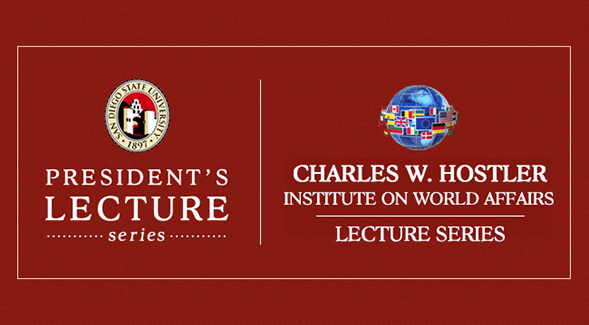Intelligence Is a Science, Diplomacy Is an Art
Ellen E. McCarthy, Assistant Secretary of State for the Bureau of Intelligence and Research, will speak at SDSU on Feb. 24.

Ellen E. McCarthy, a top official in the U.S. State Department as head of the civilian bureau that provides intelligence to the nation’s diplomats, is scheduled to visit San Diego State University for the President’s Lecture Series in conjunction with the Charles W. Hostler Institute on World Affairs.
McCarthy, assistant secretary for the Bureau of Intelligence and Research (INR), will speak on “Intelligence at the Point of Diplomacy: Ensuring All Sides are Heard.” The lecture is set for 2-3:30 p.m. on Monday, Feb. 24, in the Fowler Family Ballroom at the Parma Payne Goodall Alumni Center.
The event is free and open to the public. Reservations are appreciated, but not required, and can be made online.
McCarthy has been a mainstay in the intelligence community for more than 20 years, serving in such roles as chief operating officer of the National Geospatial-Intelligence Agency, director of the Human Capital Management Office and acting director of Security in the Office of the Under Secretary of Defense for Intelligence. She was appointed to her current position by President Trump in January 2019.
The SDSU News Team asked McCarthy about the mission of the Bureau of Intelligence and Research and the biggest challenges in U.S. diplomacy these days.
Your lecture is titled "Intelligence at the Point of Diplomacy: Ensuring All Sides are Heard." What will be the focus of your lecture and what do you hope members of the SDSU community take away?
My intent is to talk about my agency, the Bureau of Intelligence and Research of the U.S. State Department, commonly referred to as “INR,” and review our long and distinguished history of providing intelligence to our diplomats and the nation.
I will review the role of intelligence and highlight that intelligence is a science, diplomacy is an art. INR provides its best assessment of what is going on in the world based on intelligence resources, but the diplomats need to weigh that against other factors and data when making or implementing foreign policy.
INR is a great resource in this regard based on our relationship with the policymaker, our depth of experience (average 17 years on a region or function) and the composition of our workforce, which is about 20 percent foreign service.
I hope the SDSU community will take away the critical role intelligence plays in the development and execution of America’s foreign policy, my pride in INR, and hopefully, some will consider intelligence as a career field.
For some who may not know, what is the mission of the Bureau of Intelligence and Research and how do Americans benefit from this work?
INR’s mission is to ensure that timely, independent all-source analysis informs foreign policy decisions and that intelligence and counter-intelligence activities support and are informed by America’s foreign policy.
The fundamental goal of America’s foreign policy is to protect and promote the interests of the American people. INR exists to ensure that the diplomatic corps – the policy makers – have the most accurate and up-to-date information at all times to inform their decisions, discussions, and plans for executing that foreign policy. It is our responsibility to the American people, and we take it very seriously.
Much of your career has been spent in intelligence. What first drew you to this community and what motivates you to continue this work?
I did not dream of working in the Intelligence Community, the “IC,” as a young child. My dream was to own a golden retriever, run “Proceedings” magazine and live in a house that looked over the Chesapeake Bay in Annapolis.
I really fell into this career thanks to great bosses Phil Merrill, publisher of the “Capital” newspaper, Andy Hull at IDA (Institute for Defense Analyses), and a little tenacity.
It took about 24 hours as a Soviet submarine analyst at the Office of Naval Intelligence to realize I was hooked. I love what the IC does for the country by keeping it safe.
I love being surrounded by really smart people who share the same goal, and these people work in 16 different agencies with different backgrounds and competencies, but we are tied together. I love that we have a private sector cadre that also wants to serve. I love that we are not political – we serve many masters regardless of party, background or whatever. I love that the IC always wants to get to yes. We are dreamers. We figure out how to do the impossible.
What are the biggest challenges in U.S. diplomacy these days?
The world is so much more complex. It is not just about war and peace, but now health, environment, development, science and technology, education, law and the arts.
There is increased bureaucratization and increased politicization; nothing is black and white – non state actors, malign influence, and gray zone. And, domestic policy is now intimately linked with foreign policy.
These are realities that U.S. diplomats have to deal with every day. As the providers of intelligence to inform diplomacy, we strive to ensure we are able to provide them factual, complete and timely intelligence.



